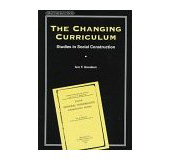The Changing Curriculum: studies in social construction
Chariots of Fire
The progressive refinement of an epistemology suited to State schooling then embraces the trilogy of pedagogy, curriculum and examination. Until recently the 'triple alliance' of academic subjects, academic examinations and able students have been able to enjoy a clear hierarchy of status and resources. Thus our understanding of curriculum has to focus mainly on analysing the dominant convention of the school subject and the associated examination by university boards. The linking of resources to 'academic' subjects places a priority on subjects that can be presented as 'academic disciplines' and this places further power in the hands of the universities. Not that the power of the universities over curriculum is unchallenged, the challenges are recurrent. Reid has noted that a major area of conflict is between the external constraints arising from university requirements and the internal pressures which have their origins in the school:
Schools are, however, poorly equipped to resist university pressures. To a large extent they allow the legitimacy of the university demands, and have evolved an authority structure which is linked to them (Reid 1972, p.106).
Such recurrent conflict is of course likely as the school subjects 'progresses' away from Layton's early stage where 'the dominant criterion is relevance to the needs and interests of the learners'. But as we have seen an epistemology has been institutionalised and resourced which places the academic 'discipline' at the top of the curriculum apex. Not surprising the culminating stage in the establishment of an 'academic' subject celebrates the power of scholars to define the disciplines' field. In this culminating stage however Layton argues that related to this change in who defines school knowledge 'Students are initiated into a tradition, their attitudes approaching passivity and resignation, a prelude to disenchantment' (Layton 1972).
The final stage of Layton's model summarises (and comments upon) the kind of political 'settlement' with regard to curriculum, pedagogy and evaluation in operation. Plainly however there are recurrent conflicts and the 'achievement' of this 'settlement' has been a painstaking and deeply contested process. It is important when assessing the contribution of scholars of education to establish how their work resonates with the contested nature of education generally and curriculum specifically. As always there is a danger of accepting that which is worked for and achieved as a fait accompli, a given. Nothing could be further from the truth.
